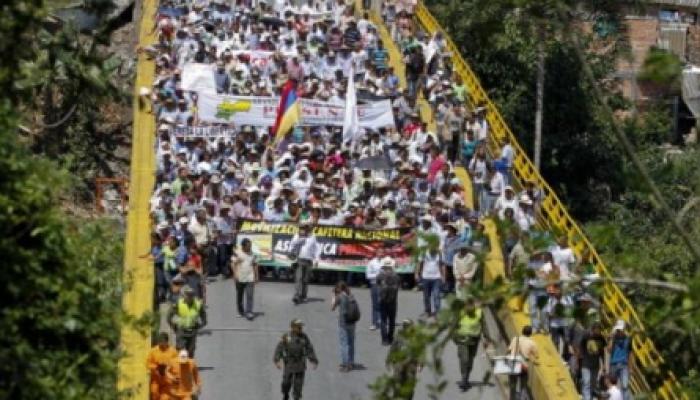Bogotá, May 9 (RHC) – Riot police have been deployed in Bogota where students from various universities in the capital protested in favor of agricultural reforms and strikes, which on Friday entered their eleventh day.
On Thursday, students from three universities blocked major thoroughfares, burned tires, threw debris at authorities and disrupted downtown Bogota for roughly six hours before calm was restored. Since the agricultural strikes began on April 28th, an estimated 120 people have been injured nationwide and talks between the government and the farmers’ unions have frequently stalled.
“The door is open to the unions for when they feel it is the right time,” said Rubén Darío Lizarralde, Colombian Minister for Agriculture in an interview with El Tiempo newspaper.
“We are going over the agendas agreed last year,” he said. “We are not going to increase or open new debates.”
The strikes are a repeat of nationwide demonstrations that took place in August, 2013 which paralyzed the countryside leaving five people dead and scores injured. Colombian farmers are protesting various issues including international Free Trade Agreements and the costs of fuel and transport, which they say are detrimental to their livelihoods.
While agreements were reached on these terms last year, bringing about an end to over 20 days of nationwide blockades, representatives of the farmers unions say that the government has failed to comply with what was agreed upon.
The government of President Juan Manuel Santos, who is seeking re-election on May 25th, will be looking to move swiftly on the current strike as indigenous groups have said that they plan to join in, swelling the number of protesters.
Land reform and agricultural rights are a source of major discontent in Colombia and many believe that this is the cause of the long running civil conflict. The first item on the agenda for the peace dialogues taking place here in Havana, between the FARC (Revolutionary Armed Forces of Colombia) guerrillas and the government, which began in 2012, was the issue of agrarian reform.


